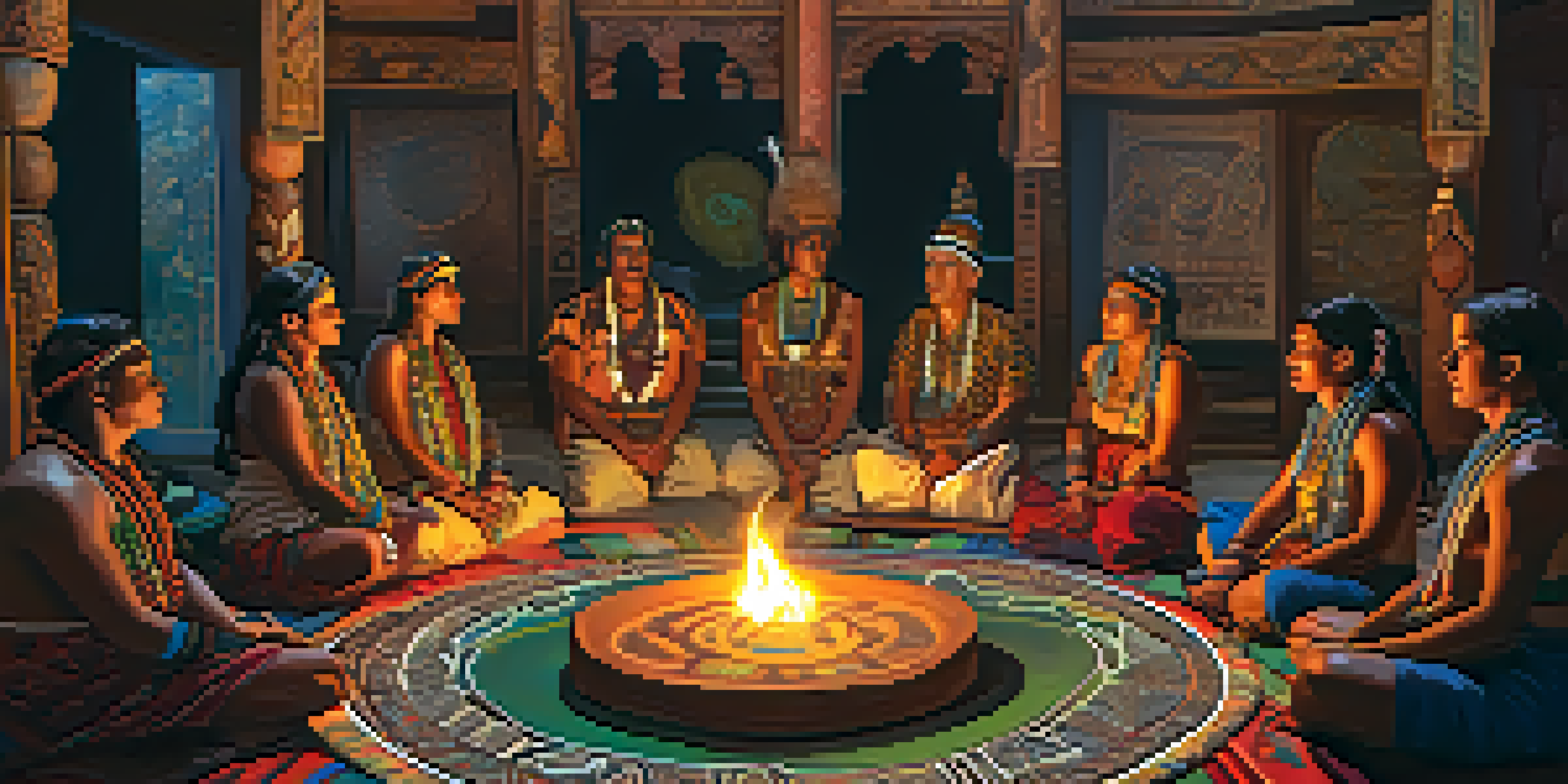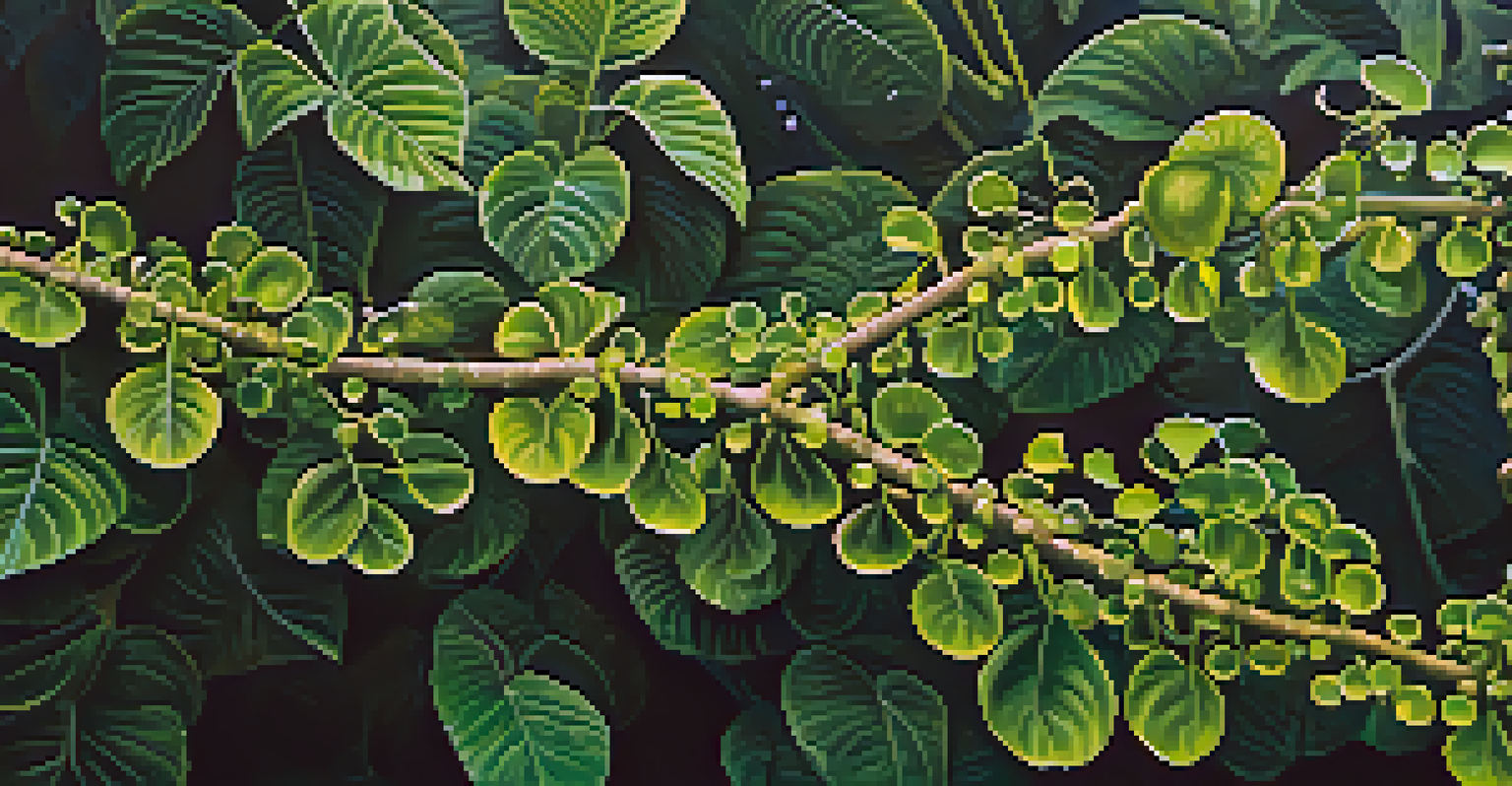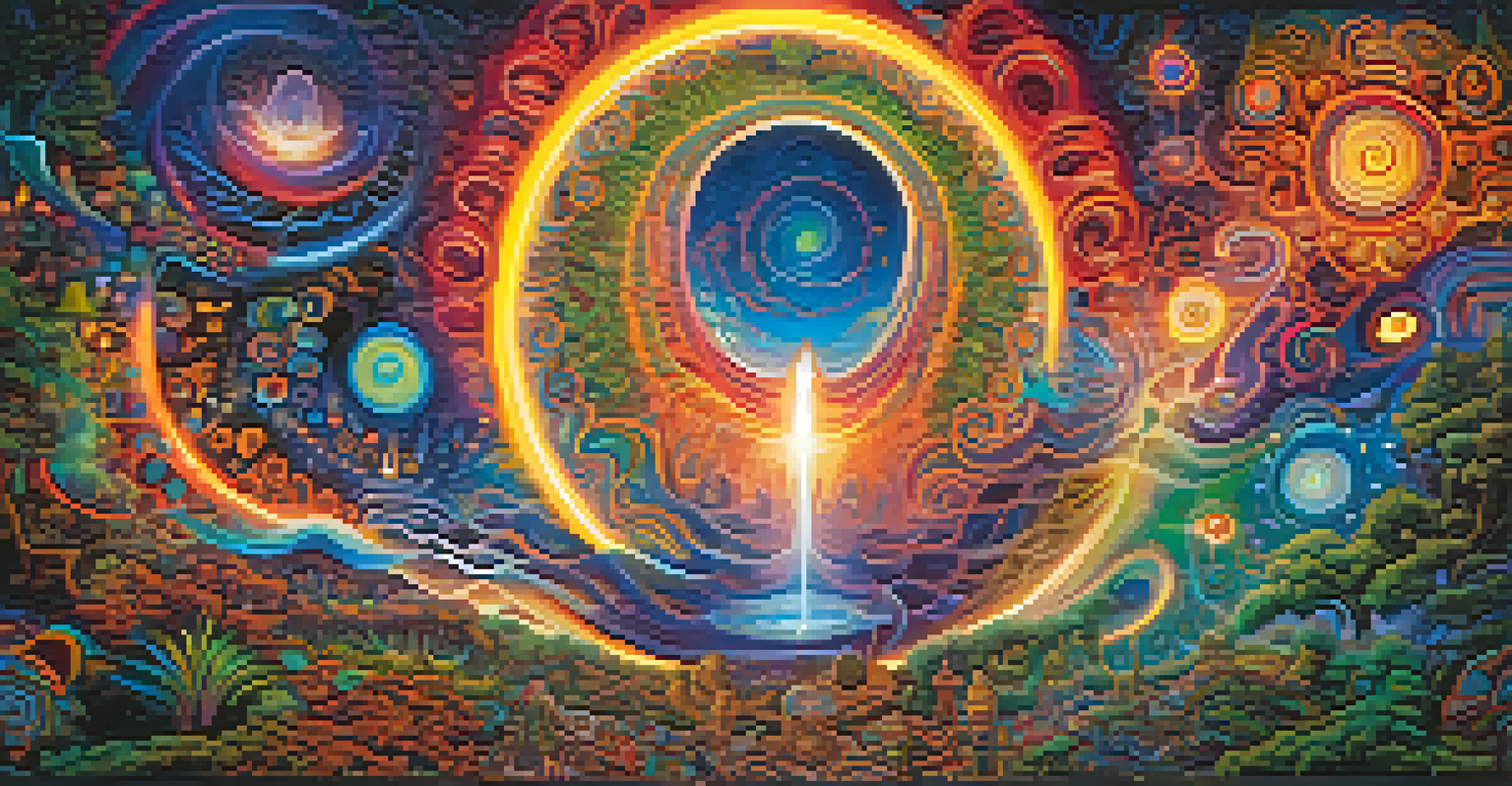Cultural Significance of Ayahuasca Ceremonial Practices

Understanding Ayahuasca: A Sacred Plant Medicine
Ayahuasca, a powerful brew made from the Banisteriopsis caapi vine and other plants, holds a sacred place in many indigenous cultures of the Amazon. Traditionally used in shamanic practices, it serves as a gateway to spiritual insight and healing. The concoction is rich in DMT, a natural psychedelic that facilitates profound experiences and connections to the spiritual realm.
The experience of Ayahuasca allows individuals to confront and process repressed emotions, leading to a profound sense of healing.
For many, the experience of consuming Ayahuasca is not merely recreational but deeply transformative. Participants often describe visions that lead to personal revelations and a greater understanding of their place in the universe. This connection to the spiritual world is an integral aspect of the ceremonial practices surrounding Ayahuasca.
As awareness of Ayahuasca spreads beyond its native roots, it raises questions about cultural appropriation and respect for its origins. Understanding its significance in indigenous cultures is crucial for anyone considering participating in a ceremony.
The Role of the Shaman in Ayahuasca Ceremonies
In Ayahuasca ceremonies, the shaman, or curandero, plays a pivotal role as both guide and facilitator. They are often seen as spiritual leaders who carry the wisdom of their ancestors and the traditions of their people. The shaman prepares the brew and leads participants through the experience, using songs, or icaros, to invoke healing energies.

The relationship between the shaman and participants is built on trust and respect. Shamans often spend years training and learning the intricacies of the plants and their effects on the human psyche. This knowledge is essential in ensuring that the ceremony is safe and meaningful for everyone involved.
Ayahuasca's Transformative Power
Ayahuasca serves as a gateway for spiritual insight and healing, facilitating profound personal revelations during ceremonies.
Moreover, the shaman's role extends beyond the ceremony itself; they often provide aftercare and integration support to help participants process their experiences. This holistic approach is a vital part of the cultural significance of Ayahuasca practices, emphasizing community and connection.
Ceremonial Structure: What to Expect
An Ayahuasca ceremony typically unfolds in a structured environment designed to promote safety and spiritual exploration. Participants gather in a designated space, often dimly lit and adorned with sacred objects. The atmosphere is intentionally curated to facilitate introspection and connection to the divine.
Respect for indigenous traditions is essential in maintaining the integrity and authenticity of Ayahuasca practices.
Ceremonies often begin with a prayer or invocation, setting the intention for the journey ahead. After consuming the brew, participants may experience a range of emotions and visions, which can be both beautiful and challenging. The shaman guides the process, ensuring that the energy remains positive and supportive throughout.
As the experience intensifies, participants might move through stages of clarity, introspection, and release. The communal aspect of the ceremony plays a significant role, as sharing experiences with fellow participants fosters a sense of unity and support.
Healing and Spiritual Growth Through Ayahuasca
Many participants report profound healing and spiritual growth as a result of their Ayahuasca experiences. The brew can bring forth repressed emotions and unresolved traumas, allowing individuals to confront and process these feelings. This cathartic release can lead to significant personal breakthroughs.
Furthermore, Ayahuasca is often used to treat various mental health issues, including depression and anxiety. The insights gained during ceremonies can provide new perspectives and coping strategies, empowering individuals to take charge of their well-being.
Cultural Respect is Crucial
Understanding the cultural significance of Ayahuasca is vital for participants to honor its indigenous roots and avoid appropriation.
The healing journey, however, does not end with the ceremony. Integration into daily life is crucial, and many participants find ongoing support through community and therapy. This continued exploration of self is a testament to the lasting impact of Ayahuasca practices.
Cultural Context: Ayahuasca in Indigenous Traditions
Ayahuasca is deeply woven into the fabric of many indigenous cultures in the Amazon, where it is used for spiritual, medicinal, and communal purposes. For these communities, the plant is not just a tool for healing; it is a sacred teacher that provides insights into nature, existence, and the cosmos. The traditions surrounding its use have been passed down through generations, preserving valuable cultural knowledge.
In these cultures, Ayahuasca ceremonies are often communal events that strengthen social bonds and reinforce shared beliefs. They serve as a way to connect with ancestors and honor the spirits of the land. This communal aspect is essential in maintaining the cultural identity and resilience of indigenous peoples.
As the global interest in Ayahuasca grows, it is crucial to recognize and respect its cultural roots. Engaging with these traditions mindfully ensures the preservation of indigenous knowledge and practices while promoting a deeper understanding of the plant's significance.
The Western Adaptation of Ayahuasca Practices
As Ayahuasca has gained popularity in Western societies, many practitioners have adapted traditional practices to fit modern contexts. This adaptation has led to a surge in Ayahuasca retreats and ceremonies outside of their indigenous settings. While this has made the experience more accessible, it raises questions about authenticity and cultural sensitivity.
Some practitioners strive to honor the traditions of the Amazon, integrating elements of the original ceremonies into their practices. However, others may prioritize profit over respect, leading to a commercialization of Ayahuasca that can dilute its cultural significance. This tension highlights the importance of understanding and valuing the roots of these practices.
Ethics in Ayahuasca Tourism
As Ayahuasca tourism rises, ethical considerations must guide respectful participation and support for indigenous communities.
For those interested in participating in Ayahuasca ceremonies, it's crucial to seek out authentic experiences that prioritize the wisdom of indigenous cultures. Engaging with reputable facilitators who respect the traditions can ensure a more meaningful and responsible exploration of this sacred practice.
Ethical Considerations in Ayahuasca Tourism
With the rise of Ayahuasca tourism, ethical considerations have become increasingly important. Tourists seeking spiritual experiences must navigate a landscape where exploitation and misrepresentation can occur. It’s essential to approach Ayahuasca practices with a mindset of respect and humility.
Many indigenous communities have expressed concerns about the commercialization of their traditions, fearing that the essence of their practices may be lost. This highlights the need for responsible tourism that supports local communities while preserving cultural integrity. By choosing to engage with ceremonies that honor indigenous practices, tourists can contribute positively to the cultural exchange.

Ultimately, ethical participation involves understanding the cultural significance of Ayahuasca and recognizing one's role within the broader context. This awareness fosters a deeper appreciation for the traditions surrounding Ayahuasca and encourages a more respectful approach to spiritual exploration.